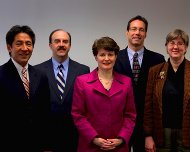8/22/2009
Arlington Sues Virginia Over HOT LanesArlington, Virginia sues federal and state officials over proposal to turn part of Interstate 95-395 into a toll road.

The Arlington County Board on Wednesday filed suit against the Commonwealth of Virginia and the Federal Highway Administration (FHWA) over the High Occupancy Toll (HOT) Lanes project proposed for Interstates 95 and 395. The Virginia Department of Transportation (VDOT) has been determined to sell the existing High Occupancy Vehicle (HOV) ride-sharing lanes to an Australian company in return for an up-front payment. Arlington officials claimed that in the rush to ram the project through the system, state and federal officials bypassed environmental laws.
"I wish it did not have to come to this, but the County was left with no alternative," Board Chairman Barbara A. Favola said in a statement. "We are encouraged that VDOT has elected to delay the project."
The primary objection of officials in the liberal stronghold of Arlington is that this deal appears to favor automobiles over mass transit and could create additional noise that would bother residents living near the highway. Arlington has also been raising questions since 2005 about the potentially high cost of tolls, bottlenecks where the toll lanes end at the border with the District of Columbia, the safety impact of narrowing lanes and the impact on side street traffic patterns.
"While affluent commuters who drive alone will get improved access to existing, highly efficient transit and the HOV corridor, those who cannot afford the tolls will experience longer commutes," the county board said in its statement. "The project will also worsen air quality in the region, particularly along the project corridor, disparately impacting low income and minority communities."
The I-395 HOT Lane project, however, does not involve any new construction. An Australian tolling company, Transurban, will restripe and narrow the existing HOV lanes to include three lanes within the current space built with federal and state taxpayer dollars for two lanes. These lanes reverse depending on the time of day. Arlington's suit claims that turning the eight-lane freeway into a nine-lane highway will make a significant difference in "harmful air emissions."
FHWA granted VDOT a "categorical exclusion" to environmental requirements for the project, allowing the project to proceed more quickly. This allowed VDOT to skip nearly all of the mandatory public comment periods and minimize public input on the project. Arlington's lawsuit claims that this analysis done to support the exclusion was insufficient and must be redone.
"The county cannot support the project unless the commonwealth agrees to postpone the agreement with Fluor-Transurban and properly and adequately models and evaluates the project in accordance with all applicable standards and guidelines in order to determine the project's impacts on transit and HOV, traffic in the non-restricted lanes, and local streets," Arlington County Attorney Stephen MacIsaac said. "We urge the state to ensure that the project is redesigned to reflect the new analysis and full range of impacts; and fund the mitigation of those impacts by incorporating the mitigation measures in the agreement with Fluor-Transurban."


